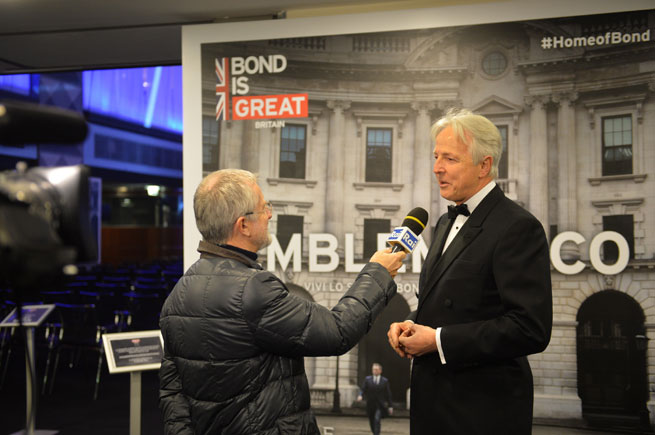I’m writing this from Italy, one of the most Anglophile countries on earth. Didn’t you know? Trust me: I hear in the streets that we’ve got young kids called Jennifer, Ryan, Kevin, and more. Hardly anyone bothers to call their children Maria or Giuseppe anymore. Too traditional.
Nevermind that people with an English first name and an Italian surname may sound like a character from The Godfather. People are not worried by that – and quite rightly so. Reaching out to foreign cultures, however goofily, is an act of curiosity and interest towards others.
 So, Mr Bond, you expect me to buy? The UK's ambassador to Rome at a launch event for the movie Spectre
So, Mr Bond, you expect me to buy? The UK's ambassador to Rome at a launch event for the movie Spectre
Often, films and music – magic tools of the so-called ‘soft power’ – have gently pushed people to study English in their spare time too, away from school desks. As the seasoned journalist Beppe Severgnini recently said while commenting on Brexit for the Italian daily Corriere della Sera (Severgnini knows the UK like the back of his hand, having worked as a London correspondent first and for The Economist afterwards), “the English language doesn’t solely belong to the British, it belongs to us all.”
Naturally, many young and not-so-young people – economically struggling, sure, but often not and simply looking to expand their horizons – choose to expatriate and move to the UK. You’re seeing a lot of EU immigration because if you do know a foreign language, even when you’re not that fluent to start off with, that is likely to be English.
Take the desperados in Calais who could have settled in France – a relatively successful country, after all – but didn’t want to. Many of us did wonder why risk your life by sneaking inside a lorry? Why risk being caught and deported to begin all over again? Why leave France if your aim to reach a wealthy western democracy has finally been achieved?
The answer came from a young man, who’d travelled half the world to get there and was still hungry for more. He told the journalist Owen Jones, writing for theNew Statesman, that he wanted to reach the UK because he spoke English already and couldn’t face the fact of having to learn French from scratch, a whole new language for him.
Again, soft power. Popular culture (including football), business and diplomacy have spread English everywhere. The initial vehicle for this was the Empire. What we see now has its roots in a time long past.
Over the past thirty to forty years, many in Europe have started learning English from the first year of primary school. It’s everyone’s second languagenow. Levels of fluency may vary, yet overall language competence has risen dramatically.
Through work, I have been able to ascertain that the best speakers of English in Europe are to be found in the Netherlands, Scandinavia and Portugal. Surprisingly, Italians, Spaniards and Eastern Europeans are catching up fast. English-language fluency in the EU’s east is even more remarkable: unlike romance languages which share a lot of vocabulary with English (the most Latinised of Germanic languages), Slavic ones have precious little in common with the world’s lingua franca.
Poles, for example, have come a long way with their English and should be complimented for that, even if one does get bombarded with Anglo-American stimuli from the cradle: middle-class anxiety is huge on the Continent when it comes to kids learning English, with adults putting a lot of pressure on themselves too. Evening courses are always full.
So, that’s to partly explain how we’ve come to Brexit – Europe’s historical schism. It’s also to do with soft power veering out of control. Too much attraction. Appeal gone bonkers.
True, the actual amount of foreigners in Britain is way lower than their perceived numbers, but ultimately, in the ballot box, it’s how voters feel that counts. If you reckon you’re surrounded by too many non-indigenous because you see them everywhere, perhaps there’s some truth in this: immigration ought to be curtailed.
If anything, to prove that Britain’s ills won’t disappear by simply lifting the drawbridge on the EU: they have nothing to do with supposed swathes of strangers driving pay down, stealing jobs and choking NHS queues while irritatingly speaking in tongues.
On the contrary: the problems come from those mastering English lexical nuances too well to lord it over tens of millions. A type of power you’d call brutal rather than soft.
This article was originally published by OpenDemocracy under a CC-BY-NC licence

Rate and Review
Rate this article
Review this article
Log into OpenLearn to leave reviews and join in the conversation.
Article reviews